This post contains affiliate links. Please see our disclosure policy.
These 14 signs of vitamin D deficiency might seem common, but the health conditions they can lead to may surprise you. Learn the symptoms of low vitamin D levels, and the best ways to rebalance your system for optimal health and wellbeing.
Vitamin D deficiencies don’t just happen for communities that live further from the equator, or only during the winter months. Low levels of vitamin D, or the “sunshine vitamin” are common in the United States.
Many of us assume vitamin d supplementation isn’t necessary. But, less than 10 percent of women over the age of 50 are getting the recommended amount through food.
Unfortunately there very few foods have therapeutic levels of vitamin D that will naturally support our health needs. Many people are also spending an increasing amount of time indoors, both working and living.
That combination creates a higher risk for lower vitamin D levels. Can you even imagine getting enough natural vitamin D outside in the middle of a midwest winter?
Let’s explore the most common signs of vitamin D deficiency below to see if you might be at risk, and how you can boost your intake.
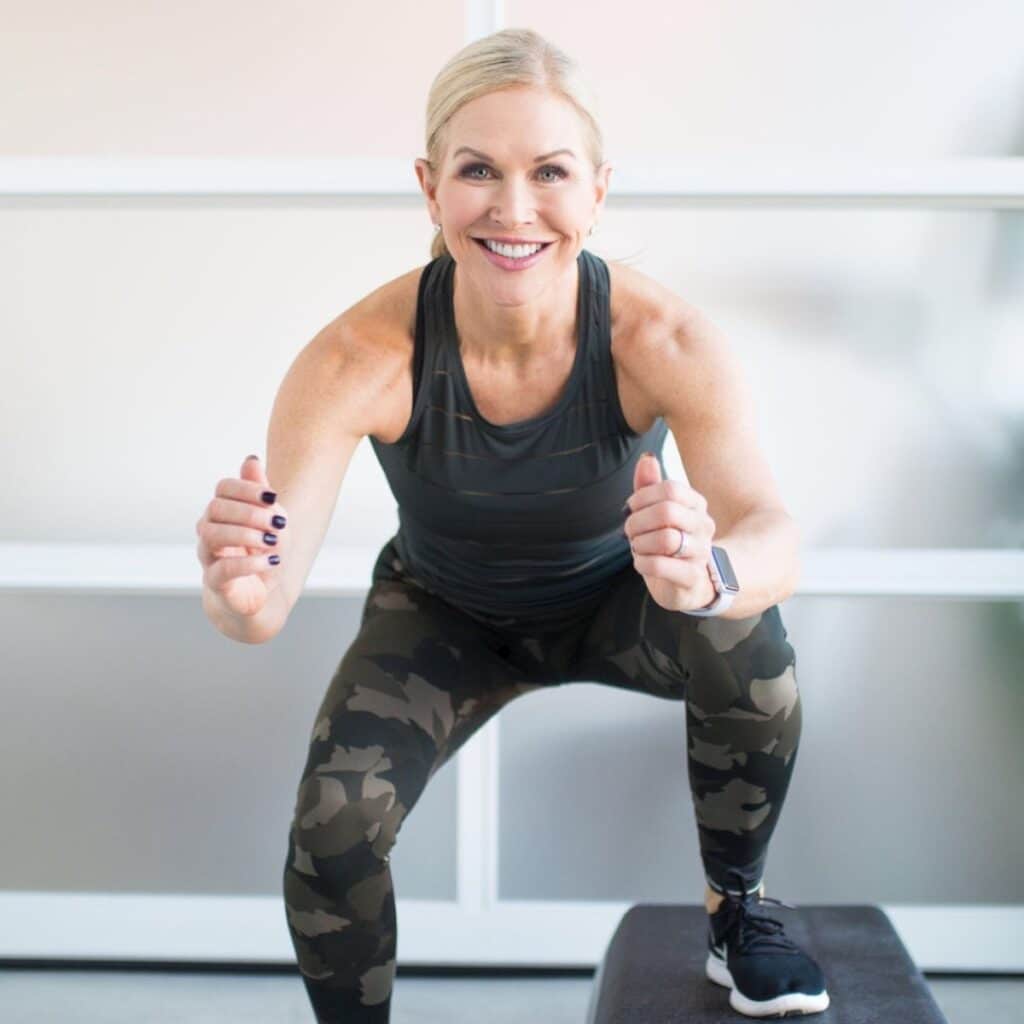
Save This Article To Read Later
Table of Contents
- 1. Persistent Aches
- 2. Fatigue
- 3. White Spots
- 4. Getting Sick Easily
- 5. Heart Palpitations
- 6. Dizziness
- 7. Weight Gain & Obesity
- 8. Fingernail Changes
- 9. Lower Back Pain
- 10. Head Sweating & Hair Loss
- 11. Darker Skin
- 12. Gut Trouble
- 13. Depression
- 14. Aged 50+
- How to Improve Vitamin D Deficiency Safely
- Best Supplements for Treating Vitamin D Deficiencies
- Vitamin D2 vs. Vitamin D3
- What is Vitamin K?
- FAQ
1. Persistent Aches
If you’re noticing persistent aches or muscle weakness it might be caused by low vitamin D levels. When levels are low your body isn’t able to absorb calcium and phosphorus at the same efficiency.
This causes an increased risk of symptoms like bone pain, muscle pain, muscle weakness, falls, low bone mass, and even bone fractures.
If left untreated, these symptoms could turn into later diagnoses of osteomalacia, osteoporosis, and myopathy.
2. Fatigue
Vitamin D can help keep your immune system healthy and your energy levels up. When there is a lack of vitamin D, your energy levels can start to deplete. If you’re feeling exhausted or more fatigue than usual, it may be worth considering whether you are getting enough of this essential vitamin.
Feelings of fatigue might also come from the depression or feelings of sadness that are common signs of vitamin D deficiency.
3. White Spots
Not only can you experience white spots or patches on your skin from low levels of vitamin D, you might also notice a dull complexion, less glow, dry or flaky skin on your face or other areas of your body.
The white patches are not typically a cause for concern, but a good sign that your body is telling you something is off.
4. Getting Sick Easily
Vitamin D plays an important role in our immune system. If vitamin D levels are too low, our body’s ability to fight off infections weakens. As you can imagine, this will greatly increase the chance of getting sick.
You may notice frequent colds, the flu, or respiratory tract infections like bronchitis and pneumonia.
5. Heart Palpitations
Vitamin D has an influence on calcium in the body. Low levels of calcium (hypocalcemia) can cause irregular heartbeat. At a severe level this could lead to cardiac events.
So believe it or not, because of it’s relationship with calcium, low levels of vitamin D can lead to heart palpitations or other heart related symptoms.
Correcting your vitamin D levels and practicing regular cardiovascular exercise should help.
6. Dizziness
Vitamin D has an impact on many bodily functions. One of these is our circadian rhythm, which helps us regulate sleep. If you are vitamin D deficient, your sleep may be off too. Lack of sleep can cause feelings of tiredness, fatigue, lightheadedness, dizziness, and even chronic fatigue syndrome.
These are my favorite tips for getting better sleep.
7. Weight Gain & Obesity
Vitamin D is fat soluble, which means the more body fat you have, the more it gets diluted. People who are overweight or obese may require more daily vitamin D to make up for this dilution effect.
Not to mention, with depression and fatigue being other possible symptoms, it can be difficult to maintain regular exercise, like strength training, and stay healthy!
8. Fingernail Changes
There are lots of vitamins that are important for your hair and and nails. Vitamin D is one of them. Low levels of vitamin D can make nails feel softer and thinner than usual.
The medical term for this is hapalonychia. It can cause your nails to break more easily, or split and flake at the end.
9. Lower Back Pain
You may not have thought lower back pain could be linked to the “sunshine vitamin” but it can be! Lower back pain and bone pain in general can be a symptom of vitamin D deficiency. Vitamin D helps our body absorb calcium, which helps maintain bone health.
Without enough, we start to see decreased muscle strength in the waist, back and neck.
10. Head Sweating & Hair Loss
One of the classic signs of vitamin D deficiency is a sweaty head. Oddly enough, doctors used to ask new mothers about head sweating in their newborns for this very reason.
You should also pay attention to changes in sweating patterns, and hair loss in general.
11. Darker Skin
To make the same amount of vitamin D, someone with very dark skin needs 10 times the amount of sun exposure compared to someone with very pale complexion. Similarly, although sunscreen is highly recommended, a sunscreen with 30 SPF reduces your skin’s ability to make vitamin D by 97%.
12. Gut Trouble
Since vitamin D is a fat-soluble vitamin, this means if you have gastrointestinal condition that affects your ability to absorb fat, you’ll likely have trouble absorbing fat-soluble vitamins like vitamin D.
This includes people with Crohn’s, celiac or inflammatory bowel diseases.
13. Depression
Vitamin D seems to improve levels of serotonin, a neurotransmitter, which has been known to boost your mood. Studies have shown healthy adults given vitamin D supplements during the cooler months reported greater positive mood than given a placebo.
Vitamin D is important for your mental health!
14. Aged 50+
According to the American Cancer Society, your skin does not make as much vitamin D as you get older. And in fact, your kidneys start to become less productive when it comes to converting vitamin D into the form the body puts to good use.
Additionally, many adults over 50 tend to spend less time outdoors resulting in less sun exposure compared to younger adults.
How to Improve Vitamin D Deficiency Safely
You can improve your vitamin D deficiency by catching some rays outside, making changes to your diet, or trying a supplement. Learn a little more about each option below!
Sunlight
You probably guessed it, but you can get more of this “sunshine vitamin” from getting outside. Sensible sun exposure is key. Vitamin D production only occurs on unprotected skin.
So you’ll need to expose your arms, legs, abdomen and back for max vitamin D production. That being said, be mindful of your body’s sensitivity to burn.
You may only make vitamin D for part of the year due to the angle of the sun, and depending on where you live. If that’s the case you’ll need to consider your next best option.
Nutrition
It’s difficult to get your full vitamin D intake through nutrition, but you can find it in certain foods. Foods like fatty fish (salmon, tuna, mackerel, sardines), fortified milk, cod liver oil, egg yolks, and mushrooms are good options.
But remember, less than 10 percent of women over the age of 50 are getting the right amount of vitamin D through their diet.
Supplements
During the cooler, darker months the recommended solution is vitamin D supplements. They are an inexpensive and effective way to lower your risk of vitamin D deficiency.
Be sure to choose a high quality vitamin D supplement blended with a non-GMO oil.
I’ve included a little more information about vitamin D supplements and my favorite picks below!
Best Supplements for Treating Vitamin D Deficiencies
If you can’t maintain high levels of vitamin D through extra sunlight or dietary intake, you may need to consider taking a vitamin D supplement. Vitamin D supplements come in various forms, although pills are most common.
Supplements become even more important when you’re over the age of 50 or in any phase of menopause. Menopause can occur anywhere in your 40’s or 50’s, but the average age is 51 for women in the United States. The major changes in hormone levels, metabolism, and energy mean it’s even more important to monitor what your body needs.
I always recommend choosing high quality supplements, and that’s no different for vitamin D. I recommend getting D3 because it’s much more effective.
You can view more of my recommendations in my guide to the best supplements for menopause weight gain.
Here are my recommendations for the best vitamin D supplements:
Metagenics Vitamin D3 + K2
This Metagenics Vitamin D3 + K is a high-potency, bioactive vitamin D with vitamin K. It provides 5,000 iu of vitamin D with each softgel. This Metagenics option is non-GMO and gluten-free.
Pure Encapsulations Vitamin D3 & K2
Pure Encapsulations are made with premium ingredients and have verified potency and purity.
Their products are free from wheat, eggs, tree nuts, peanuts, gluten, artificial colors, flavors and sweeteners, coatings, DMOs, unnecessary binders, fillers and preservatives.
Thorne Vitamin D + K2 Liquid
Thorne is a great option for those who prefer liquids. This brand is trusted by over 45,000 health-care professionals and a long list of professional sports teams.
Their self-dispensing liquid product allows for accurate and individualized dosing, without having to swallow a pill.
Pure Encapsulations Vitamin D3
For anyone who can’t or chooses not to take Vitamin K, I recommend this simpler version of the Pure Encapsulations. It offers the same great Vitamin D quality, just without Vitamin K.
If you’re interested in learning more about supplements, be sure to check out my recommendations for the best vitamins women should take over 50, including vitamin D!
I put together a list of the supplements to take for menopausal weight gain, because many women struggle to get rid of menopausal belly fat. In addition to vitamin D, you want to watch out for calcium, magnesium, B vitamins, collagen, omega-3s, and vitamin C.
Vitamin D2 vs. Vitamin D3
If you are looking to take a supplement, I recommend D3. I personally take a vitamin D3 supplement which uses cholecalciferol, the same form of vitamin D found in fish, eggs and the one produced naturally by sunlight on human skin.
While the body is able to use D2 for some functions, D3 is the preferred source as it is absorbed much more effectively. In fact, D3 is said to convert up to 400x faster and is 4x more effective than D2.
What is Vitamin K?
Vitamin K plays an essential role in blood coagulation (blood clots) and bone density. I prioritize choosing a vitamin D supplement with vitamin K because research shows there are powerful bone and cardiovascular benefits when combining it with vitamin D.
Vitamin D plays an important part in decreasing our risk factors for serious health problems. Keep these important signs of vitamin D deficiency in mind as you notice changes to your daily health.
You might be surprised what a little vitamin D supplement could do!
FAQ
While it’s possible, less than 10 percent of women over the age of 50 are getting the recommended amount of vitamin D through their food. I did a Q&A with a dietitian to get their thoughts on whether we really need vitamins to stay healthy.
Vitamin D helps keep your immune system healthy, maintain strong bones and teeth, helps the body absorb calcium and phosphorus, and helps decrease the risk of colorectal and bladder cancers.
Research shows that individuals with higher body fat tend to have lower levels of vitamin D compared to those of a healthier weight. Like we mentioned above, quite a few of the signs of vitamin D deficiency could make it harder to maintain an active healthy lifestyle.
It’s recommended for people aged 50-70 to get 15 micrograms daily (600 IU) daily, and those over 70 should get 20 micrograms (800 IU). It’s common to take 5,000 IU or more daily, depending on the severity of the deficiency.
Vitamin K plays a critical role in blood coagulation (blood clots) and bone density. Research has shown that there are powerful bone and cardiovascular benefits when the two vitamins are combine together.
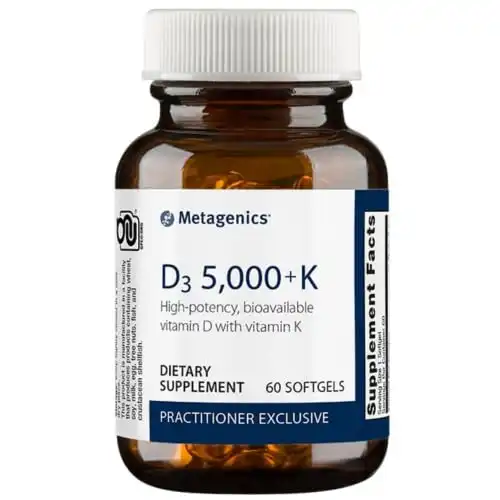
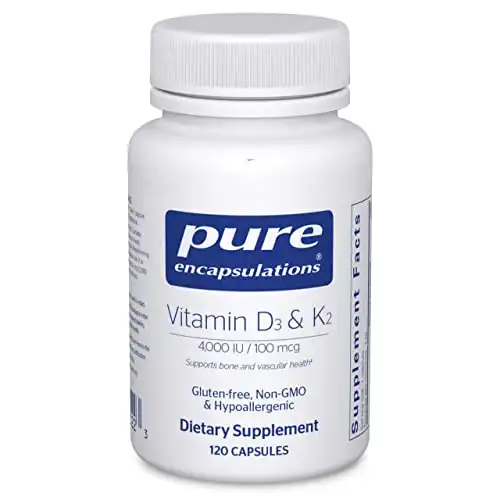
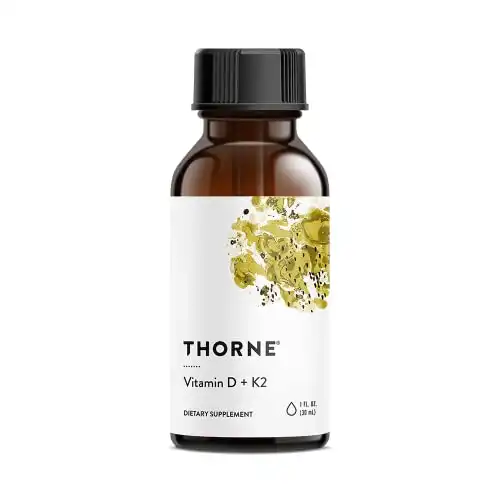
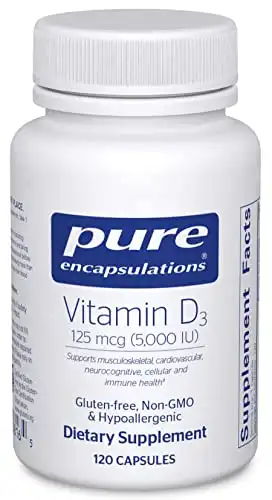



How many milligrams per day should you take?
Hi Carmen – Vitamin D intake is recommended at 400–800 IU/day, or 10–20 micrograms. However, if really depends on each person. Check out this article: (http://www.webmd.com/osteoporosis/features/the-truth-about-vitamin-d-how-much-vitamin-d-do-you-need) for more information or consult with your doctor!